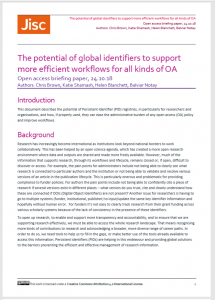A New Open Access Briefing Paper: “The Potential of Global Identifiers to Support More Efficient Workflows for All Kinds of OA”
From a New Open Access Briefing Paper from JISC:
This document describes the potential of Persistent Identifier (PID) registries, in particularly for researchers and organisations, and how, if properly used, they can ease the administrative burden of any open access (OA) policy and improve workflows.
Background
Research has increasingly become international as institutions look beyond national borders to work collaboratively. This has been helped by an open science agenda, which has created a more open research environment where data and outputs are shared and made more freely available. However, much of the information that supports research, through its workflows and lifecycle, remains closed or, if open, difficult to discover or access. For example, the pain points for administrators include not being able to clearly see what research is connected to particular authors and the institution or not being able to validate and resolve various versions of an article in the publication lifecycle. This is particularly onerous and problematic for providing compliance to funder policies. For authors the pain points include not being able to confidently cite a piece of research if several versions exist in different places – what version do you trust, cite and clearly understand how these are connected if DOIs (Digital Object Identifiers) are not present? Another issue for researchers is having to go to multiple systems (funder, institutional, publisher) to input/update the same key identifier information and hopefully without human error. For funders it’s not easy to clearly track research from their grant funding across various scholarly systems because of the lack of consistency in the presence of these identifiers.
To open up research, to enable and support more transparency and accountability, and to ensure that we are supporting research effectively, we must be able to access the whole research landscape. That means recognising more kinds of contributions to research and acknowledging a broader, more diverse range of career paths. In order to do so, we need tools to help us to fill in the gaps, or make better use of the tools already available to access this information. Persistent identifiers (PIDs) are helping in this endeavour and providing global solutions to the barriers preventing the efficient and effective management of research information.
Read the Complete Briefing Document (approx. 3300 words) ||| PDF Version (9 pages)
Filed under: Data Files, Funding, Journal Articles, Management and Leadership, News, Open Access, Publishing
About Gary Price
Gary Price (gprice@gmail.com) is a librarian, writer, consultant, and frequent conference speaker based in the Washington D.C. metro area. He earned his MLIS degree from Wayne State University in Detroit. Price has won several awards including the SLA Innovations in Technology Award and Alumnus of the Year from the Wayne St. University Library and Information Science Program. From 2006-2009 he was Director of Online Information Services at Ask.com.



